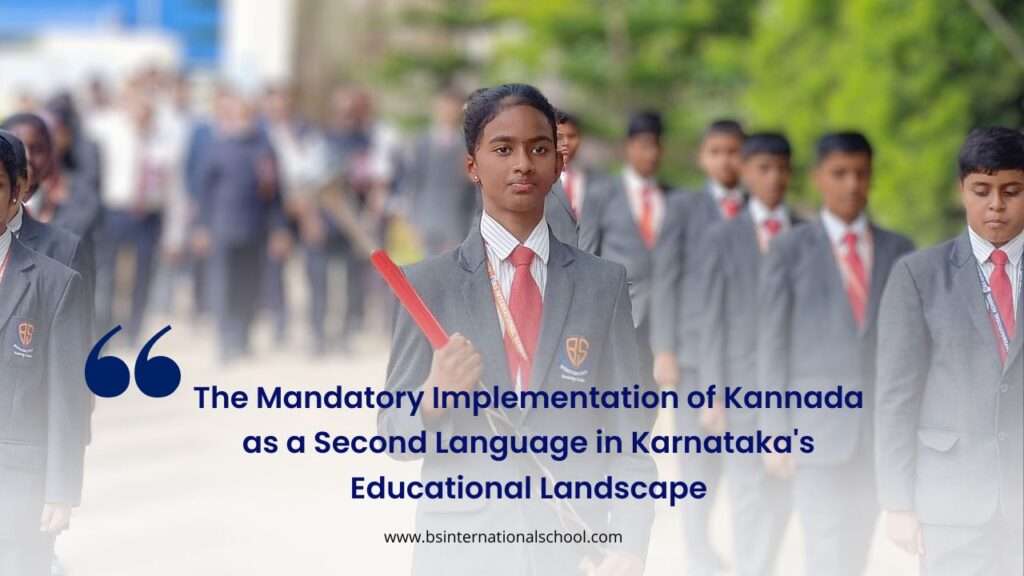Bsis's NewsSports NewsStudent's Corner
Is the Kannada language compulsory in Bangalore schools?
bsischools
November 6, 2023
Bsis's Heros
Here us on Podcast
“Join us on this educational journey – subscribe to BS International School Podcast and stay inspired!”
Have Any Question?
Feel free to call BSIS’s Admin team for more information
- +91 93640 05826
- enquiry@bsinternationalschool.com

The Mandatory Implementation of Kannada as a Second Language in Karnataka's Educational Landscape
In the academic year 2020-2021, the Indian state of Karnataka took a significant step to promote the Kannada language and culture by making Kannada a mandatory second language in all schools, regardless of their syllabus – CBSE, ICSE, or State Board. This decision marked a historic moment in Karnataka’s educational landscape and sparked discussions and debates across the state. However, it is essential to understand the reasons behind this mandate, its implications, and the measures taken to enforce it.

The Mandate for Kannada as a Second Language
Kannada, the official language of Karnataka, holds a special place in the state’s cultural identity. To preserve and promote the language, the Karnataka government decided to introduce Kannada as a second language in all schools across the state. This decision was a significant move to strengthen the roots of Kannada culture and language in the hearts and minds of the younger generation.
This mandate was enforced in both government and private schools, and it applied to all boards of education, including CBSE, ICSE, and the State Board. The rationale behind this decision was to ensure that all students, irrespective of their educational background, have an opportunity to learn and appreciate the beauty of Kannada, the culture it represents, and its historical significance.
Preservation of Language and Culture: The primary aim of making Kannada mandatory is to preserve the rich linguistic and cultural heritage of Karnataka. By promoting the language in schools, the government intends to ensure that Kannada continues to thrive and evolve with the times.
Unifying Factor: The mandate also serves as a unifying factor for students from diverse backgrounds. It helps bridge linguistic gaps and fosters a sense of unity among the youth, as they all learn a common second language.
Greater Access: The decision ensures that every student has the opportunity to learn Kannada, irrespective of the school they attend. This levels the playing field and prevents linguistic discrimination.
Enforcement Measures
The Karnataka government has taken strict measures to ensure that all schools comply with the Kannada mandate. Any school found not implementing this rule faces financial penalties, and in extreme cases, they may be threatened with closure. The enforcement is aimed at maintaining uniformity in the educational system across the state.
The fines imposed are proportionate to the severity of the violation, ranging from warnings to substantial monetary penalties. This stringent approach is intended to deter schools from flouting the rules and to underscore the government’s commitment to the cause.
Public Reaction and Ongoing Debates
The implementation of Kannada as a second language has sparked a variety of opinions among students, parents, and educators. While many have welcomed this initiative, some have expressed concerns about the practicality of introducing Kannada as a second language, especially in schools that primarily follow other syllabi.
Ongoing debates revolve around the need for flexibility in the implementation, accommodation for students from non-Kannada-speaking backgrounds, and the quality of language instruction. There is a call for the government to provide additional support and resources to ensure effective teaching and learning of Kannada.
Conclusion
The mandatory implementation of Kannada as a second language in Karnataka, regardless of the syllabus, is a bold and ambitious move to preserve the state’s linguistic and cultural heritage. While there are ongoing debates and challenges in ensuring a smooth transition, this initiative reflects the government’s commitment to fostering unity, promoting linguistic diversity, and nurturing a sense of identity among the younger generation. With continued efforts and support from all stakeholders, this mandate can contribute to the enriched cultural fabric of Karnataka and provide students with a well-rounded education that appreciates the value of language and heritage.



